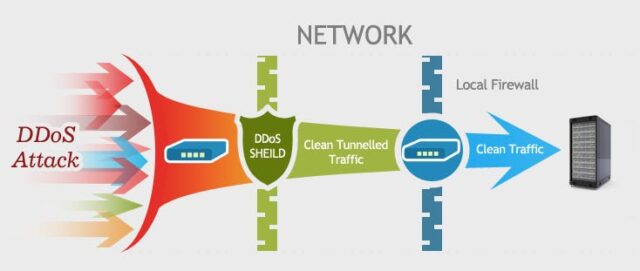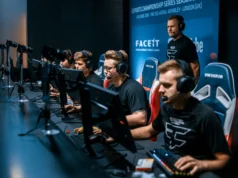
In an ever-expanding online community where millions of players navigate virtual landscapes, communication is essential for fostering strategic coordination, team dynamics, and shared experiences.
Whether orchestrating complex maneuvers through voice chats or swiftly relaying vital information via messaging systems, having secure in-game communication is highly important.
As we’re starting this digital odyssey, it becomes clear that the stakes are high, and the need for robust security measures is higher than ever.
1. The Risks of Using Open Channels

The online gaming world can be brutal. In this arena, ensuring the confidentiality and integrity of in-game conversations is crucial. Here, a Virtual Private Network (VPN) can serve as an essential ally in the ongoing battle for secure communication.
But how does it work? Imagine a VPN as a digital cloak of invisibility, shrouding your words from prying eyes by encrypting the data flowing between your device and the game server.
Reliable VPNs like CyberGhost operate as a sophisticated security layer, keeping the integrity of your communications within the game confidential. This encryption makes it significantly harder for potential hackers to intercept or eavesdrop on your discussions.
It’s like having a secure line of communication that ensures your strategies remain your own, known only to your trusted comrades.
2. Securing Privacy in the Crossfire
Voice chat, a cornerstone of modern multiplayer experiences, is not immune to cyber threats. The rise of “swatting,” where malicious actors exploit a player’s sensitive information to locate and harass them in the real world, underscores the critical need for robust security in gaming.
According to recent studies, a staggering 78% of gamers express concern about their privacy during online gaming. These pervasive concerns highlight the growing awareness within the gaming community about the potential risks associated with open communication channels.
Furthermore, this encouraged governments and policymakers to address this issue more seriously and start developing legal frameworks for dealing with this issue.
3. Defending Against DDoS Attacks
Imagine this scenario: you’re deeply immersed in an intense gaming session, coordinating with your team through voice chat, when suddenly, the entire game grinds to a halt.
You’ve fallen victim to a Distributed Denial of Service (DDoS) attack—a known cyberattack that floods the game server with traffic, causing it to shut down.
These attacks can extend beyond disrupting gameplay to affecting voice and text communication channels, ruining your strategic planning or friendly banter.
According to cybersecurity reports, the frequency of DDoS attacks is expected to rise by 15% annually. This statistic shows the urgent need for proactive measures to safeguard in-game communications, as well as the importance of raising awareness among players.
4. Beyond Encryption: The Social Dynamics of Security

The cybersecurity industry is growing each year, and it’s trying to find suitable ways to tackle more vicious attacks. While encryption technologies are paramount, fostering a secure gaming environment extends beyond technical measures.
It involves educating the gaming community about responsible online behavior and creating a culture of awareness and collaboration.
Developers, in particular, play an important role in this narrative by integrating user-friendly security features and conducting awareness campaigns.
Every gaming community should have players, developers, and cybersecurity experts collaborating to build a resilient ecosystem.
Aside from using protective tools and techniques to promote a culture of respect and fair play, the gaming community can collectively fight against potential threats.
This collaborative effort can create a safer and more enjoyable virtual playground for everyone.
5. The Future of Secure Gaming
Developers must stay ahead of the curve by continually adapting security measures to address emerging cyber threats.
Technologies like blockchain, with its potential for secure transactions and communication and advanced AI-driven threat detection mechanisms, could be a cornerstone of the future protective mechanisms in the gaming world.
The gaming community, in turn, should remain vigilant and proactive in adopting these technologies.
A collective commitment to staying informed about cybersecurity best practices and integrating cutting-edge technologies into gaming experiences can elevate the security standards of the entire gaming industry.
6. The Need for Continuous Learning
In the quest for secure in-game communications, it’s vital to address that pliers can be the biggest part of the problem. Aside from technological solutions, gaming communities have the responsibility to keep the online environment safe.
Encouraging ethical behavior, reporting suspicious activities, and fostering a sense of togetherness can contribute significantly to a safer gaming experience.
Developers can further enhance security by integrating user-friendly reporting mechanisms and providing clear guidelines on responsible gaming. Gamers, in turn, should embrace a code of conduct that promotes fair play and respect for fellow players.
7. The Road Ahead: Adapting to Emerging Threats

As the gaming landscape continues to evolve, so do the challenges posed by cyber threats. Developers must remain agile in adapting security measures to counter emerging threats effectively.
Emerging technologies like edge computing, which brings processing power closer to the player, can enhance security by reducing latency and minimizing vulnerabilities.
Additionally, the integration of biometric authentication and advanced behavior analysis can add an extra layer of protection against unauthorized access. For instance, using sophisticated access management solutions like Okta can significantly reduce exposure to online risks.
However, the road ahead involves a continuous cycle of innovation, where developers and cybersecurity experts collaborate to stay one step ahead of cyber adversaries, ensuring that the virtual realms remain secure and enjoyable for all.
Conclusion
In conclusion, securing in-game communications is not merely a luxury but a necessity in the ever-expanding universe of online gaming. A VPN stands as a sentinel, guarding your words and interactions from the unseen dangers that lurk in the digital shadows.
As we navigate the expansive landscapes of multiplayer realms, let’s fortify our digital bastions, empower our fellow gamers with knowledge, and collectively raise the standards of security.
For, in the world of pixels and polygons, the battle for secure in-game communication is a quest worth not just undertaking but championing for the future of gaming.














